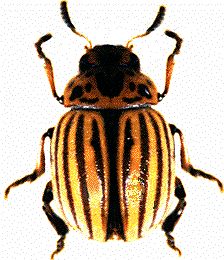Pesticide resistance

Insect pests are a major economic and health problem. The evolution of resistance to pesticides causes misery to millions of people, whether through disease or reduced food supply.
• The global incidence of malaria has almost exploded: to an estimated 200 million victims by 1972 and 300 million now. Pesticide resistance is an important reason for the increase: malaria is caused by a protozoan blood parasite, and humans are infected with it by mosquitoes.
• Insect pests such as the Colorado potato beetle are very destructive: at present they destroy about 20% of world crop production, and it has been estimated that in the absence of effective pesticides as much as 50% would be lost.
As more pests are sprayed with pesticides, more evolve resistance: in 1983, over 400 insect species were resistant to one or more pesticide. The list grows longer every year. However, the rapid evolution of resistance to pesticides provides a marvellously clear example of evolution by natural selection.
The image opposite is of the destructive Colarado beetle.
What are the genetics of pesticide resistance?
| Next |



